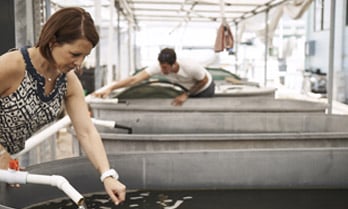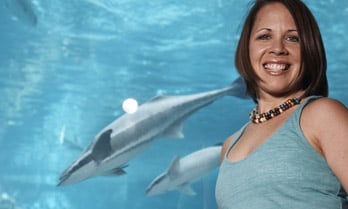







12 October 2020
Will extreme corals bide us time in order to protect our Great Barrier Reef?
“Climate change is threatening coral reefs and we may lose reefs - as we know them - within our lifetime.”
We have a real risk of losing the Great Barrier Reef (GBR) in our lifetime, without intervention. Beyond dramatically reducing carbon emissions, very few things exist to reduce coral destruction. But even if we stopped all carbon emissions rights now, the coral reefs will still have to survive a lag phase while the oceans re-equilibrate.
Coral biologist and marine bio-geochemist, Dr Emma Camp, fears coral reefs do not have that sort of time and is focusing her research on finding resistant corals that have the ability to deal with temperature, pH and oxygen stress. Emma hopes to understand the genetic traits of these corals, and to seed a stock of corals that can bide us time as we take action on reducing our carbon emissions - the most important step in protecting our environment.
The iconic GBR - the size of Italy - is the largest living structure on Earth, and is visible from space. Currently, climate change is the greatest threat to the GBR and coral reefs around the world. Coral reefs cover less than 1% of the ocean floor but house 20% of marine life. The GBR alone hosts over 9,000 species of marine life, providing a rich platform of biodiversity, making its conservation not only desirable - but essential.
“The GBR needs time. While we put pressure on governments and industries to tackle carbon emissions we are also exploring innovative reef restoration needed to ensure the long-term survival of pockets of live coral. And so I am finding the most resistant corals to create these pockets as well as understand what makes them resistant.”
With already 30% of the GBR lost to coral bleaching caused by marine heatwaves, resilient corals may provide pockets of growth to give us more time. Emma works with approximately 20-50 species of extreme corals, accounting for only a small number of the 500+ species in the GBR. So these alone cannot protect the GBR, but as these corals appear resilient to conditions intensifying with climate change, they will hopefully provide the time and insights necessary to restore coral growth.
Beyond the environmental and marine significance, the GBR is vital to many communities and industries, generating $6.4 billion AUD per year (excluding indigenous value) that is central to the Australian economy, way of life, and international reputation. Underpinning these ecosystem services and values of the GBR is coral health, which is declining at a drastic rate, as a result of reduced water quality and climate stressors. After a progressive loss of coral cover since 1984, the GBR has now lost >30% of all corals in just two years from back-to-back marine heatwaves (2016–17). This year also saw a further widespread coral bleaching event on the GBR, making it three in the last 5 years. To confront this reef crisis, there has been a national call to enhance knowledge on coral reef resilience and explore adaptive reef management opportunities.